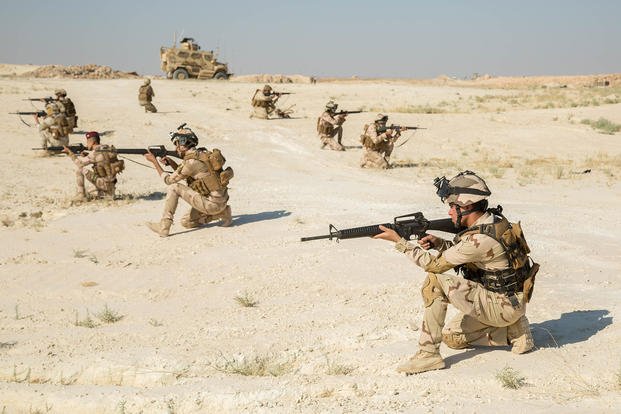The United States and Iraq have reached an agreement to withdraw American combat forces carrying out the fight against the Islamic State. But it won't happen quite yet.
In a joint statement released Wednesday, the two governments agreed that the Iraqi Security Forces are improving and increasingly able to protect their own nation. And the ISF's increasing capacity has allowed U.S. and coalition forces to shift to a mission focused primarily on training and advising, allowing any remaining combat forces in Iraq to be redeployed, according to the statement.
The timing of the combat forces' withdrawal will be settled during upcoming talks, the U.S. and Iraq said. But they reaffirmed that U.S. forces are in Iraq to support the ISF against ISIS, and that both nations intend to keep working together on security matters.
Read Next: Iran Ship Said to Be Red Sea Troop Base off Yemen Attacked
"The transition of U.S. and other international forces away from combat operations to training, equipping and assisting the ISF reflects the success of their strategic partnership and ensures support to the ISF's continued efforts to ensure ISIS can never again threaten Iraq's stability," the statement adds.
In a briefing with reporters Wednesday, Pentagon spokesman John Kirby stressed that the U.S. military's fight against ISIS was always going to end at some point.
"There was no expectation that it was going to be a permanent, enduring mission or footprint," he said. "So I think we've all been working toward the eventual redeployment, when we both agree. And the Iraqis believe that there's a need for that mission to end, and there's no need for American support on the ground."
Kirby said there are still 2,500 U.S. troops in Iraq, adding that their mission had already largely evolved into an "advise and assist" role. It is unclear how many of those forces will be considered combat troops and subject to redeployment, or when the next technical talks on redeployment will take place.
The agreement does not spell out a date for withdrawal, or requirements for troop numbers to reach a certain point by a certain time, Kirby said. Eventually, he explained, the nations will determine the appropriate time to redeploy combat troops and what the footprint of any remaining forces will look like.
The U.S. will still advise and assist Iraqi forces to help them further improve their ability to fight ISIS, he said.
"Both sides agree that that mission is still important," Kirby said. "The invitation by the Iraqi government is still in place. And we're continuing as we have been, even before today's talks, to talk with the Iraqi government about what that mission and that footprint will look like."
Kirby said he expects that Iraqi forces will be much more able to withstand future incursions than they were in 2014, as ISIS tore across the nation.
When the U.S. last withdrew troops from Iraq in 2011, he said, the ISF was capable and competent. But in the wake of America's departure, he said, Iraqi forces weren't managed well enough to keep that combat capability in place; the force became more sectarian and wasn't able to effectively fight back against ISIS.
And while ISIS remains dangerous, Kirby said, it is also a much diminished threat from what it was seven years ago in terms of size, capability, competence, resourcing and recruiting ability. Territorially, he said, ISIS holds virtually no ground anymore.
"That's a testament not just to what the United States has been able to contribute to the effort, but to the whole coalition," he said. "And it's also a testament to the Iraqi Security Forces in the manner in which they have improved their capability and responded to the training and the assistance that they've been getting from the coalition. ... They are a vastly better force than they were before."
-- Stephen Losey can be reached at stephen.losey@military.com. Follow him on Twitter @StephenLosey.
Related: Iraq Kills ISIS Commander, a Week After Baghdad Suicide Blasts












